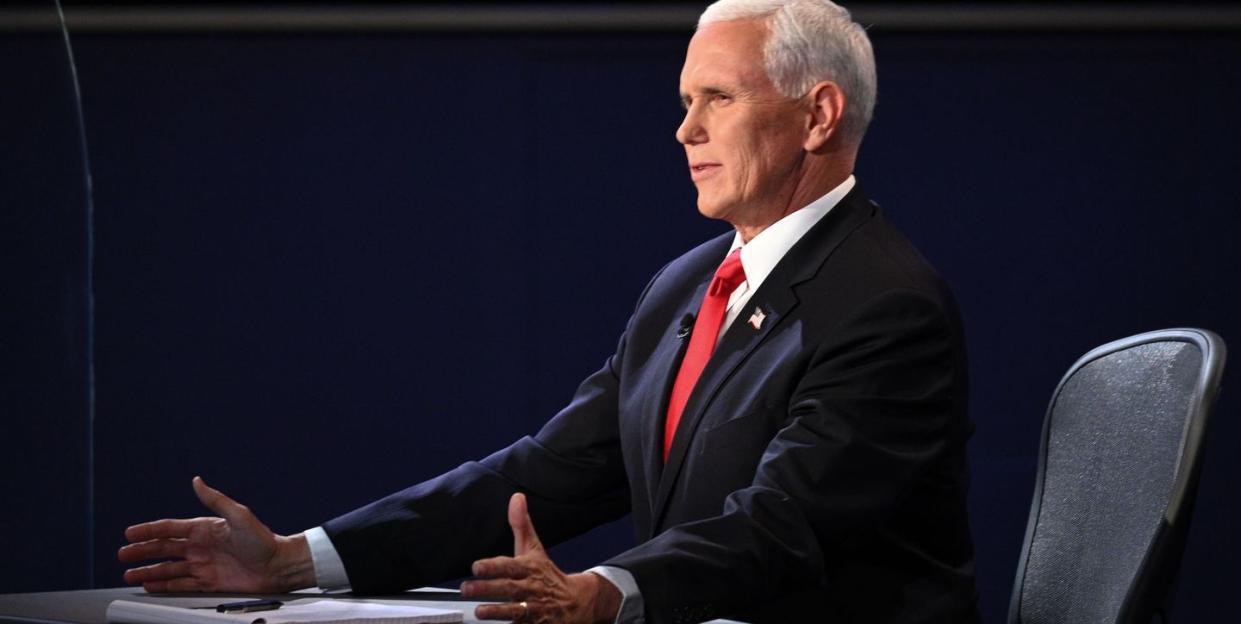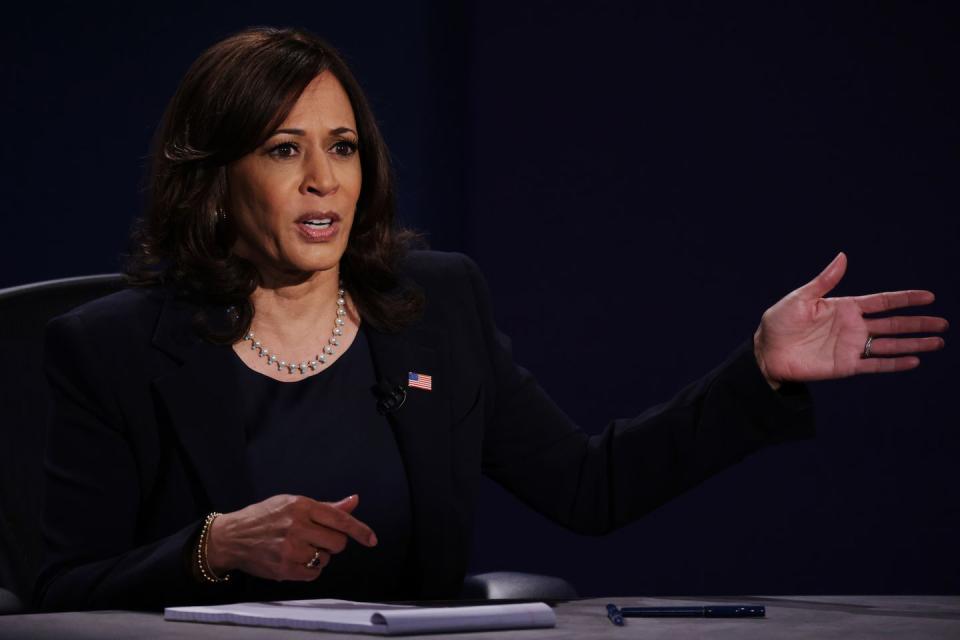The Climate Portion of the Vice-Presidential Debate Was Incredibly Depressing

After years of presidential assault on the truth through direct and overwhelming force, there was an insidious feel to the deception served up by Vice President Mike Pence at Wednesday night's debate. The veep is a political liar in the old school, mostly twisting and evasive as he delivered his lines while maintaining Easter Island Statue Face. There were some outright lies, like when Pence trotted out the administration's number-one talking point on their coronavirus response: that the president "banned" travel from China. This is false—it did not apply to the 40,000 people who made the journey after—and it probably wouldn't have helped much anyway, considering the worst of the United States outbreak was imported from Europe. Also, the vice president refused—like his boss—to pledge that he'd accept the results of a democratic election. The moderator, Susan Page, followed this up by reading some kid's question asking why we can't all get along.
But mostly, Pence's deceptions were more subtle, perhaps because he delivered them in the kind of measured, declarative tone that a big chunk of political observers process as Civil and Dignified. For instance, few seemed to bat an eye when the vice president declared, in response to a climate question, that "President Trump has made it clear we're going to listen to science." Uh, what? The Chinese hoax guy? The let's-pump-methane-into-the-sky guy? This was Pence's line immediately preceding that: "Now with regard to climate change, the climate is changing, but the issue is what’s the cause and what do we do about it." So they're already not listening to the science. The consensus among scientists who actually study this is that human activity is causing the climate to change. That's the whole point. Pretending we don't know the cause constitutes disregarding the science. It also allows you to do nothing about the problem, which is, of course, the point.
"The climate is changing, but the issue is, what's the cause?" -- Mike Pence is out here pretending like climate science is unsettled. It's not. pic.twitter.com/ZWPtB7tGKp
— Aaron Rupar (@atrupar) October 8, 2020
But this was actually the second part of Pence's assault on reality. While Page was asking the question, anyone who's watched these people over the last few years knew what was coming: we have the cleanest air, the cleanest water. That is the canned response from the president whenever he's asked about climate, despite the fact that clean air and clean water, while environmental issues, do not speak to the greenhouse effect or the many consequences of human beings pumping heat-trapping gas into the air. It's not an answer to the question, not that Pence answered much of anything.
But also: the United States does not have the cleanest air and water, even in its own recent history! The U.S. ranks in middling fashion in terms of air pollution, and the situation has deteriorated since 2016, possibly because Trump has handed over the regulatory agencies of the federal government to lobbyists for and insiders from the industries they're nominally tasked with regulating. Many other countries have a better record on clean water. Also, the climate crisis may harm air quality further. Just ask Californians.
But this complete bullshit beats on, boats against the current, because they have no shame and will apparently never be asked a followup question. This debate somehow became positively devoted to fracking, a method of natural-gas extraction that has seen a boom since the Obama administration, which has in turn corresponded with a huge spike in methane in the atmosphere. (Methane is up to 80 times more effective than carbon dioxide, the primary driver of global warming, at trapping heat.) Because of our idiotic system for electing presidents, in which a handful of states decide the outcome and one of them is Pennsylvania, where fracking is big business, Pence hammered the claim that the Biden administration would ban the practice. Kamala Harris, the nominal liberal climate defender on stage, proudly insisted that Joe would not ban fracking.
The political utility of this was clear—many Pennsylvanians support a ban on fracking, but it's probably more likely that pro-fracking types would vote on the issue—but the whole thing was incredibly depressing. The American political culture has still not come to grips with the scale of the change we are required to make in how our society functions over the next few years if we are to avoid the worst iterations of the existential threat to human civilization posed by the climate crisis. Can we afford to rule out a ban on fracking over the next four years? Natural gas might be a "bridge fuel," but how long is the bridge? The entire Western third of the country was on fire this summer, and they're onto the second page of tropical-storm names this year. Joe Biden has a $2 trillion plan to rebuild infrastructure and invest in clean energy, and they should really talk it up more, but it almost certainly will not be enough.

Meanwhile, Harris also spent time running away from the Green New Deal, much like Biden has. The polling is mixed, but it suggests the public is interested in the proposal's goals while less interested in spending the money. (The GND is not a firm policy plan but a resolution proposing far more ambitious climate goals than are currently on the table. Reaching them would undoubtedly be expensive.) The polling also suggests many have not heard much about the proposal, full stop, possibly because—you guessed it—many Democratic leaders have been running away from it. (Nancy Pelosi referred to it as the "Green Dream or Whatever They Call It.") Was it the botched rollout, featuring the foolish draft Q&A with jokes about farting cows and hamburgers, which cut-rate Joe McCarthys like Ted Cruz were always going to seize on? Is it the older Democratic leadership's deep fear of Ronald Reagan's ghost, which has terrified them out of forcefully advocating for the state's role in shaping the American economy?
Why don't we hear from Democrats about how it will actually be more expensive to do nothing—and continually clean up the damage of increasingly destructive natural disasters powered by escalating climate change—that it would be to fund clean infrastructure projects that create good-paying union jobs? Why don't they rename the Green New Deal the JOBS JOBS JOBS ACT and ram it down Mike Pence's throat? Because they are the Democrats, you say, and you are right. But they, and we, can't afford this too much longer. Someday, we're going to have to ban fracking and spend trillions to save the world. Might as well be when interest rates are low and tens of millions of Americans need a job.
You Might Also Like

